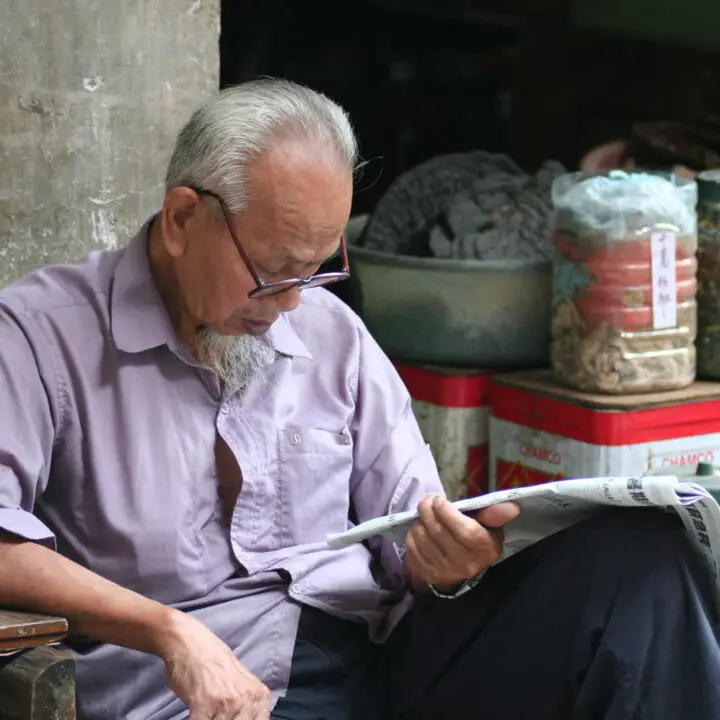
Most Sharpologist readers are no doubt familiar with the shaving culture of Western Europe and North America. But what about other parts of the world? I decided to do a little research.
Latin America

In Latin America, the practice of shaving for men goes beyond mere grooming; it is a cultural ritual that reflects traditional gender distinctions, self-definition, and masculinity. The act of shaving holds symbolic significance in shaping personal identity and adhering to cultural norms and expectations related to masculinity in the region.
- Historical Perspective: Prior to the twentieth century, shaving practices in Latin America were not as frequent as they are today. It was more common for men to shave only once or twice a week, often visiting barbers for grooming. Clean-shavenness was a relative term, with many men sporting a one or two-day growth of beard most of the time, which could also be a class-distinguishing and social activity.
- Ritualistic Practice: Shaving for men in Latin America can be seen as a ritualistic process that embodies traditional cultural gender prescriptions. The act of shaving is not just a grooming practice but a symbolic act of self-definition through which a man creates a critical element of his public masculinity – his face. In Western culture, the face is considered a unique site of expression, beauty, and character, making the act of shaving particularly meaningful(Articles – Razors, Shaving and Gender Construction: – An Inquiry into the Material Culture of Shaving, n.d.).
- Symbolic Gender Differences: Grooming rituals, including shaving, may play a role in the intergenerational transfer of gender norms. As culture emphasizes the value of being clean-shaven, teenagers often learn to shave following the rituals and implements passed down through generations. This perpetuates the cycle of symbolic gender differences, reinforcing cultural norms through material culture.
- Private vs. Public Grooming: Shaving is often performed in private, with the man with the razor and the man in the mirror being the two presences involved in the process. The act of shaving involves self-definition and aligning the mirror image with the values portrayed in advertisements, such as happiness, confidence, and success. The focus on the face and the mirror image is crucial in the ritual of shaving.
China

- Historical Perspective: Historically, the perception of beauty and grooming practices in China has evolved over time. In ancient China, having a beard was often seen as a symbol of wisdom, masculinity, and social status. However, during the Qing Dynasty, men were required to shave their foreheads and braid their hair into a queue as a sign of submission, leading to a decline in the popularity of beards.
- Mustache: Traditionally, there has been a longstanding belief that wearing a mustache brings bad luck, leading to the prevalence of cleanly shaved faces among Chinese men. This belief is deeply rooted in historical and cultural contexts, where facial hair was associated with barbarism and considered unrefined. Emperors and influential figures in Chinese history emphasized clean-shaven faces as a symbol of sophistication, discipline, and adherence to cultural norms.
- Symbolism: The symbolism and superstition surrounding facial hair in China further reinforce the cultural significance of shaving. Mustaches were believed to attract negative energy, while a shaven face was associated with purity, good fortune, and the ability to attract positive energies. This belief influenced grooming habits, with many Chinese men diligently shaving their facial hair to maintain a clean and auspicious appearance.
- Western Influence: The shift towards clean-shaven faces in modern China can be attributed to various factors, including Western influence, globalization, professional and social expectations, and changing perceptions of beauty and masculinity. The rise of global trends in fashion and grooming, along with workplace grooming standards, has contributed to the preference for a clean-shaven look among Chinese men.
Japan

The role of shaving for men in Japan has evolved over time, reflecting changes in cultural norms, fashion trends, and societal perceptions. While a clean-shaven look has traditionally been favored, there is a growing acceptance of facial hair, allowing men to express themselves through different grooming styles.
Historical Evolution of Shaving in Japan
- Ancient Origins: Shaving in Japan dates back to ancient times. The Kamisori, a traditional Japanese razor, was introduced from China during the Asuka Era (552-645) as a sacred tonsuring tool used by Buddhists. Before the Edo period, facial hair and long hairstyles were highly regarded among men, especially the Samurai.
- Meiji Era: In the Meiji Era (1868-1912), open razors were predominantly used in Japan. However, with the introduction of western civilization, foreign-made razors from places like Solingen in Germany and Sheffield in England started entering Japan. After World War 1, Gillette T-Shape safety razors were imported and gradually replaced open razors. Feather Safety Razor Company played a crucial role during this period.
- Post-World War II: Following World War II, there were significant changes in the Japanese razor market. The US clean-shaven military fashion influenced the shaving trends in Japan, and safety razors became popular. Shaving became associated with professionalism and respectability, especially for salarymen during the post-war reconstruction period. While a clean-shaven face has been the norm in Japan, attitudes towards facial hair have been changing. It is now more acceptable for men to have facial hair in various styles. Famous personalities like Hayao Miyazaki and Hideo Kojima have been seen sporting beards, reflecting a shift in societal norms regarding facial hair in Japan
India

In India, the act of shaving holds significant cultural and religious importance for men. Shaving practices in India are deeply rooted in tradition and are influenced by various factors such as religious beliefs, cultural customs, and social norms. Here are some key reasons why Indian men shave their heads:
Religious and Spiritual Significance:
- Mourning and Devotion: In Hinduism, male family members often shave their heads following the death of a loved one as a sign of mourning and respect.
- Offering to Deity: Shaving the head is also a common practice as an offering to deities when visiting holy temples or places.
- Purification Rite: Shaving the head is considered a purification ritual for men, especially those involved in performing last rites. It prepares them physically and mentally for the customary rituals.
Symbolism and Tradition:
- Letting Go of Ego: Mundan (head shaving) is symbolic of shedding ego and arrogance, especially after the death of an elderly family member. It signifies obedience and humility.
- Positive Energy: Shaving the head is believed to fill individuals with positive energy, helping them cope with grief and engage in mourning rituals with focus and commitment.
Islam

Shaving for men in Islamic culture is a nuanced practice with various considerations based on religious teachings and traditions. It can be an act of worship in specific contexts, but certain forms of shaving are discouraged or considered inappropriate. The significance of shaving in Islamic culture reflects the broader principles of piety, humility, and adherence to religious guidelines.
- Shaving in Acts of Worship: Shaving the head is considered an act of worship and a means of drawing closer to Allah in specific circumstances. This includes shaving the head during Hajj, Umrah, shaving a child’s head on the seventh day after birth, and a kaafir man becoming Muslim.
- Shaving as Shirk or Innovation: Shaving the head can be considered a form of shirk (associating others with Allah) if it is done as an act of humbling oneself before someone other than Allah. But it can also be seen as a reprehensible innovation (bid’ah) if done as an act of worship or religious devotion outside of the specified cases.
- Haraam Kinds of Shaving: There are haraam forms of shaving the head, such as shaving it in times of calamity or in a manner that resembles non-Muslims or immoral people. These practices are considered inappropriate and against Islamic teachings.
- Permissible Shaving: Shaving the head for reasons like disease prevention or lice control is considered permissible in Islam. It is also acceptable for children for hygiene purposes. However, shaving the head for no specific reason is a matter of debate among scholars.
- Differing Views on Shaving: Scholars have different opinions on the permissibility of shaving the head. Some consider it makrooh (disliked), while others view it as permissible based on certain hadiths and practices of the Prophet Muhammad (peace be upon him) and his companions.
Bibliography
Shaving Head in Islam – Islam Question & Answer. (n.d.). Retrieved June 19, 2024, from https://islamqa.info/en/answers/14051/shaving-head-in-islam
The relationship between Muslim men and their beards is a tangled one | Amanullah De Sondy | The Guardian. (n.d.). Retrieved June 19, 2024, from https://www.theguardian.com/commentisfree/2016/jan/28/muslim-men-beards-facial-hair-islam
Why do Muslim men have beards and wear turbans? (n.d.). Retrieved June 19, 2024, from https://www.alislam.org/question/muslim-men-beards-turbans/
Why do Muslim men shave their moustaches and keep free flowing beards? – Quora. (n.d.). Retrieved June 19, 2024, from https://www.quora.com/Why-do-Muslim-men-shave-their-moustaches-and-keep-free-flowing-beards
Beards in Japan: All You Need To Know | Japan Dev. (n.d.). Retrieved June 19, 2024, from https://japan-dev.com/blog/beards-in-japan
Do Japanese men shave daily? – Quora. (n.d.). Retrieved June 19, 2024, from https://www.quora.com/Do-Japanese-men-shave-daily
History and Culture of Shaving in Japan | Grooming Club. (n.d.). Retrieved June 19, 2024, from https://groomingclub.jp/museum/1054
Traditional man shaving – japan-guide.com forum. (n.d.). Retrieved June 19, 2024, from https://www.japan-guide.com/forum/quereadisplay.html?0+151470
Men’s Shaving Tips, Stubble Styling, and Personal Care Guide. (n.d.). Retrieved June 19, 2024, from https://www.gillette.co.in/en-in/tips-for-shaving
Shaving Tips For Men by Top Dermatologist In Mumbai. (n.d.). Retrieved June 19, 2024, from https://www.dermatologydiaries.com/shaving-tips-for-men/
What is the Significance of Shaving One’s Head? (n.d.). Retrieved June 19, 2024, from https://isha.sadhguru.org/en/wisdom/article/what-is-the-significance-of-shaving-ones-head
Why do Indian men shave their heads? – Quora. (n.d.). Retrieved June 19, 2024, from https://www.quora.com/Why-do-Indian-men-shave-their-heads
Why it is Important for Hindu Men to Shave off Their Head After Death in the Family? | Spirituality News, Times Now. (n.d.). Retrieved June 19, 2024, from https://www.timesnownews.com/spiritual/religious-significance-of-shaving-heads-by-hindu-men-after-death-in-the-family-article-106899162
A history of male beauty in China – Chinadaily.com.cn. (n.d.). Retrieved June 19, 2024, from https://www.chinadaily.com.cn/a/201712/09/WS5a2bae11a310eefe3e9a12d3.html
Chinese Mustache Belief: Shaven Faces & Bad Luck | Medium. (n.d.). Retrieved June 19, 2024, from https://medium.com/@456anusharao/the-shaven-faces-exploring-the-chinese-tradition-and-the-belief-around-mustaches-6f6d957cfd3d
How come ancient Chinese men almost always had beards but modern day Chinese males rarely have them? – Quora. (n.d.). Retrieved June 19, 2024, from https://www.quora.com/How-come-ancient-Chinese-men-almost-always-had-beards-but-modern-day-Chinese-males-rarely-have-them
Maintaining Personal Hygiene in Ancient China | The Nanjinger. (n.d.). Retrieved June 19, 2024, from https://www.thenanjinger.com/magazine/feature-stories/maintaining-personal-hygiene-in-ancient-china/
Why is there (generally speaking) such a marked difference between Chinese men and women with regard to dress sense and personal grooming? – Quora. (n.d.). Retrieved June 19, 2024, from https://www.quora.com/Why-is-there-generally-speaking-such-a-marked-difference-between-Chinese-men-and-women-with-regard-to-dress-sense-and-personal-grooming
Articles – Razors, Shaving and Gender Construction: – An Inquiry into the Material Culture of Shaving. (n.d.). Retrieved June 19, 2024, from https://journals.lib.unb.ca/index.php/MCR/article/download/17782/22154?inline=1
Just a moment… (n.d.). Retrieved June 19, 2024, from https://journals.sagepub.com/doi/10.1177/1097184X231151634?icid=int.sj-abstract.similar-articles.4
Men’s Grooming Demand On The Rise In Latin America. (n.d.). Retrieved June 19, 2024, from https://www.fitchsolutions.com/bmi/consumer-retail/mens-grooming-demand-rise-latin-america-19-03-2024
Resistance to Men’s Caregiving in Latin America – Equimundo. (n.d.). Retrieved June 19, 2024, from https://www.equimundo.org/does-facing-resistance-around-mens-caregiving-mean-were-making-progress-in-latin-america/
Web App – Unavailable. (n.d.). Retrieved June 19, 2024, from https://www.dukeupress.edu/changing-men-and-masculinities-in-latin-america

Fun fact! I posted this article on Facebook and within 2 min it was flagged and taken down as Spam. Guess they’re not fans.
Yikes. Facebook is weird.
Great article- very informative